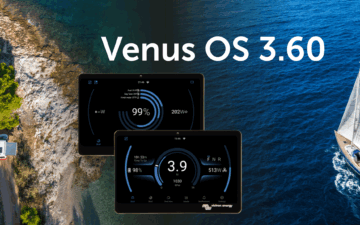
UPDATE Feb 16th 2021: Venus OS v2.63 was released today; but changes are so small that it doesn’t warrant its own post nor pushing the Wind Cargo post off the front page. The new version adds the VE.Direct connected Inverters to the list of products that are supported by the NMEA2000 out feature, as well as a few fixes. Details of those are in the change log, see link at the bottom of this post.
Good morning!
Today is the day for releasing Venus OS v2.62. For those not familiar, Venus OS is the software running on our Cerbo GX monitoring system, as well as its predecessors the Color Control GX, Venus GX and others.
Aside from various minor stability improvements, there are two changes to highlight:
Inverter RS and MPPT RS
The Inverter RS Smart Solar, and the SmartSolar MPPT RS are two recently launched new products; and with this new version they are much better supported. Both can now also be connected using their VE.Can port, rather than only through their other communication port. Also, the Inverter RS is fully integrated when it comes to its Battery Monitor function.
There is still work to do, such as having all PV details of an Inverter RS on the VRM Portal, as well as seeing the daily history when connected on its VE.Can port.
Here are two screenshots showing the history for each of the trackers. Note that these were taken on an MPPT RS 200A, having four trackers. This 200A model is not available to purchase yet but is planned for later this year.
![]()
Remote VEConfigure: automatically detect a replaced unit
This feature is directed towards installers and operators of large systems. In the unfortunate event that one inverter/charger module in a larger parallel-, split- or three-phase system needs replacing, this can now be done remotely. The steps involved are:
- Read the configuration of the whole system (or use an existing Remote VEConfigure file)
- Physically replace the failed unit
- Write the configuration. At this step the system will automatically detect that a previous device is missing, and it will discover a new device with an unknown serial number. It will assume that the new device is a replacement, and write the settings accordingly.
- (optionally) Read the new configuration file and store in your records.
Note that before starting above, make sure to update the new unit to the same version of VE.Bus firmware, which unfortunately can’t be done remotely.
How to update and conclusion
Besides the two items above, there are many more changes. All rather minor and related to certain specific situations or systems. To read them, find the full change log by logging into Victron Professional and selecting ‘Firmware’.
Information about how to install the firmware is in the manual of your GX Device. Quick links to the relevant pages: Cerbo GX, Color Control GX and for the Venus GX.
That’s it for now, all the best!
Matthijs Vader














